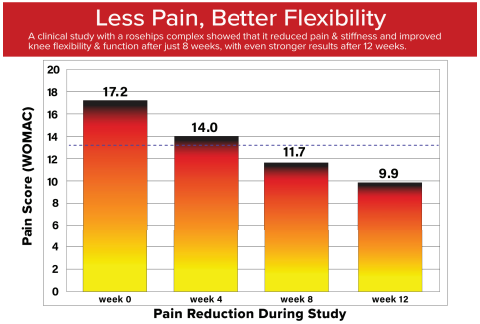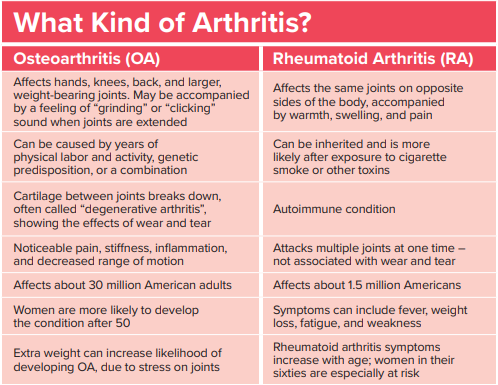If you have started to find that getting out of bed and taking those first steps is harder than it used to be, and you avoid stairs and look for easy-open bottles to spare your knees and hands, then it’s time for a change. One of the best ways to stop pain and restore your joints is by adding rosehips and type II collagen to your regimen every day.
Rosehips Preserve Your Joints
Rosehips are deep red, nutrient dense fruits that grow on the flowers of wild roses. They have an astonishing concentration of helpful compounds, especially in the peels.
So, how do rosehips help your joints? By stopping oxidative stress and inhibiting the inflammation it creates. This can prevent premature aging and wear and tear throughout your body, and keep your joints comfortable and flexible.
The culprits in oxidative stress, free radicals, are reactive by their very nature. As unstable molecules with unpaired electrons, they try to stabilize their structure by stealing electrons from other structures in the body. Sometimes this is okay. Free radicals can defend against threats to the immune system like bacteria. But generally free radicals don’t know when to quit, which is when trouble starts.
Free radical activity sets off another chain reaction that signals your body to send in inflammatory compounds like cyclooxygenase-2 (COX-2) and interleukin-1 beta (IL-1β). Like free radicals, these natural compounds can go into overdrive and start destroying joint cartilage. The result is that pain gets worse over time as those joints degrade and you lose the natural cushion, shock absorption, and flexibility of your knees, ankles, and hips.
Stops Inflammation and Supports Cushioning Cartilage
Fortunately, research shows that because rosehips decrease the activity of COX-2 and IL-1β, its downstream effect is that it also inhibits the release of cartilage-degrading enzymes metalloproteinase-1 (MMP-1) and metalloproteinase-3 (MMP-3), that wear away at the cushion between joints.
In clinical work using the rosehip extract I prefer, nearly 75 percent of the participants reported arthritis symptom relief, improved knee comfort and mobility, and less pain according to the Western Ontario McMaster Osteoarthritis Index (WOMAC) score after eight weeks. Additional research also showed even stronger relief, plus an increase in joint space after 12 weeks of supplementation —the knee joint was actually recovering some of its original cushioning ability.

Reduces Pain
Other clinical work with rosehip extract has found similar results: by preserving joints, it reduces pain and joint stiffness, and improves physical exercise and scores for individuals with osteoarthritis or rheumatoid arthritis.
One review stated rosehips “consistently reduced pain scores,” and patients who used rosehip powder “were twice as likely to respond to rosehip compared to placebo.” The review also mentioned rosehips cause none of the dangers or side effects of non-steroidal anti-inflammatory drugs (NSAIDs) and aspirin.
It’s not surprising rosehips are an excellent botanical option for both osteoarthritis and rheumatoid arthritis. They help preserve and rebuild cartilage, and they prevent the over-reaction of immune cytokines that become pro-inflammatory and need to be moderated.

Type II Collagen Saves Your Shock Absorbing Knee Cartilage
As wonderful as rosehip extracts are on their own, they have the potential to do even more when paired with type II collagen.
Type II collagen is primarily found in the cushioning cartilage between your joints, giving them strength, flexibility, and the literal spring in your step. This is the collagen that is broken down during wear and tear over time, and it is the collagen that is attacked by your own immune system in cases of rheumatoid arthritis. The overall result of clinical work with type II collagen has been impressive—it inhibits joint damage, improves mobility, and reduces pain.
For at least twenty years, researchers have investigated the role of supplemental type II collagen in people with joint pain (typically knee pain) due to osteoarthritis and rheumatoid arthritis. The results have been impressive.
Helps You Stay Active and Flexible
In one clinical study, type II collagen was used both with acetaminophen and tested against acetaminophen alone in two groups of volunteers with osteoarthritis. The group using type II collagen came out ahead with significantly less knee pain, better knee flexibility, and better walking scores compared to the acetaminophen-only group, which makes me wonder how much impact the acetaminophen had at all in the type II collagen group. But this is standard practice with a lot of pain-related studies—it’s sometimes referred to as a “rescue medication” in clinical trials that don’t already include it in the protocol. But it’s also common to advise people to take the lowest possible dose of acetaminophen due to its liver-damaging effects, which is why I don’t recommend it at all.
Other clinical research shows that type II collagen alleviates symptoms of rheumatoid arthritis, too. In this case, patients were divided into a range of dosage levels. Interestingly, even low dosages helped reduce joint pain, swelling, and tenderness.
Of course, you don’t have to be affected with arthritis to reap the benefits of type II collagen. Any physically demanding job or intensive workout can cause a flare up in pain or lead to joint damage. One clinical study of healthy, active people—without any chronic conditions—reported type II collagen helped them exercise longer and alleviated pain. It’s an excellent addition to any regimen, whether you have a chronic condition, or simply want to prevent damage or recover faster from strenuous activity.
